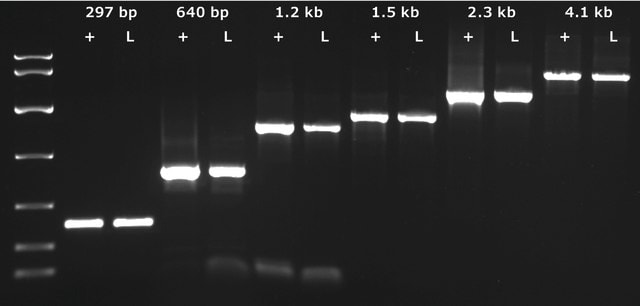2GFHSRMKB
Roche
KAPA2G Fast HotStart ReadyMix
2 ×
Sinônimo(s):
PCR, hotstart PCR
About This Item
Produtos recomendados
uso
sufficient for 100 reactions
sufficient for 500 reactions
Nível de qualidade
prazo de validade
≤18 mo.
Características
Fast PCR
Multiplex PCR
dNTPs included
hotstart
embalagem
kit of 1.25 mL (100 x 25 μL rxn; KK5603)
kit of 6.25 mL (500 x 25 μL rxn; KK5601)
fabricante/nome comercial
Roche
concentração
2 ×
técnica(s)
PCR: suitable
entrada
purified DNA
temperatura de armazenamento
−20°C
Procurando produtos similares? Visita Guia de comparação de produtos
Descrição geral
KAPA2G Fast DNA Polymerase Kits are designed for fast PCR, in which total reaction times are 20–70% shorter than those of conventional PCR assays performed with wild-type Taq DNA polymerase. This can be achieved without sacrificing reaction performance, and does not require specialized PCR consumables or thermocyclers.
KAPA2G Fast HotStart® DNA Polymerase is supplied in a convenient 2X ReadyMix format, containing all reaction components except primers and template.
Aplicação
- Routine PCR
- Fast PCR
- Reverse transcription polymerase chain reaction (RT-PCR)
- Genotyping and fluorescent PCR
Ações bioquímicas/fisiológicas
Características e benefícios
- Extension times as low as 1 sec per kilobase
- Broad coverage of both AT- and GC-rich targets
High speed, higher performance :
- Single copy sensitivity from complex targets
- Increased yields
Quick Notes :
- KAPA2G Fast HotStart ReadyMix PCR Kits contain the engineered KAPA2G Fast HotStart DNA Polymerase, developed for fast PCR.
- Use 1 sec extension time for amplicons <1 kb and 15 sec/kb for longer amplicons, and save 20–70% of total reaction time.
- No need for specialized instrumentation or PCR consumables.
- Optimized buffer system offers improved yields, specificity and sensitivity, facilitating efficient primer annealing across a wide range of primer lengths, GC contents, and melting temperatures.
- For high reaction efficiency, do not exceed 25 μL reaction volumes.
- KAPA2G Fast HotStart ReadyMix contains 1.5 mM MgCl2 at 1X.
- KAPA2G Fast HotStart ReadyMix with dye includes two inert tracking dyes to allow direct loading onto agarose gels.Reaction products are 3′-dA-tailed and may be cloned into TA cloning vectors.
Qualidade
Nota de preparo
Outras notas
Informações legais
Somente componentes do kit
- KAPA2G Fast HotStart® DNA Polymerase 0.5 U per 25 µL reaction
- MgCl2 1.5mM at 1X
- dNTP Mix 0.2 mM of each dNTP at 1X
Palavra indicadora
Warning
Frases de perigo
Declarações de precaução
Classificações de perigo
STOT SE 2
Código de classe de armazenamento
12 - Non Combustible Liquids
Classe de risco de água (WGK)
WGK 1
Ponto de fulgor (°F)
does not flash
Ponto de fulgor (°C)
does not flash
Certificados de análise (COA)
Busque Certificados de análise (COA) digitando o Número do Lote do produto. Os números de lote e remessa podem ser encontrados no rótulo de um produto após a palavra “Lot” ou “Batch”.
Já possui este produto?
Encontre a documentação dos produtos que você adquiriu recentemente na biblioteca de documentos.
Os clientes também visualizaram
Artigos
An overview of directed evolution and the methods for generating proteins with optimized or entirely new functions.
Nossa equipe de cientistas tem experiência em todas as áreas de pesquisa, incluindo Life Sciences, ciência de materiais, síntese química, cromatografia, química analítica e muitas outras.
Entre em contato com a assistência técnica






